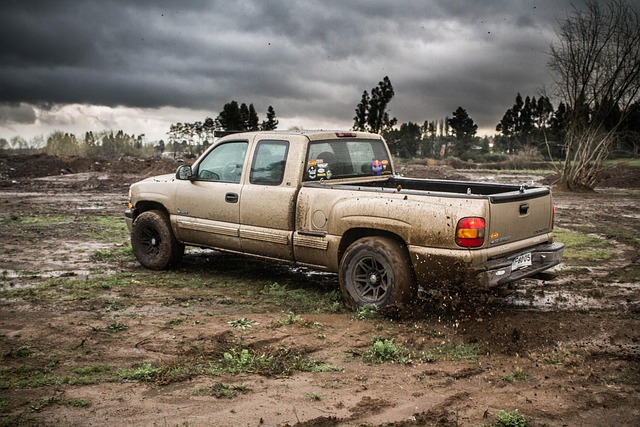ABS sensors, crucial for Brownsville Jeep Wrangler Clubs members' safety during off-road events, monitor wheel speed and prevent locking, enhancing braking control on challenging terrains. Regular maintenance, including inspections and fluid checks, is vital to ensure these sensors' longevity and optimal performance in their Wrangler vehicles. Continuous ABS advancements in technology offer improved safety features for adventurous drivers navigating unpredictable off-road conditions.
“ABS sensors are vital components of modern vehicle safety systems, including your Brownsville Jeep Wrangler. This article delves into their crucial role in preventing wheel lock during braking, enhancing control and stopping distances. We explore how these sensors work in Wrangler models, common issues, and maintenance tips to ensure optimal performance. Additionally, we discuss advanced ABS technologies found in modern Jeeps and the safety benefits they offer members of Brownsville Jeep Wrangler clubs.”
- Understanding ABS Sensors: Function and Importance
- How ABS Sensors Work in Your Jeep Wrangler
- Common ABS Sensor Issues and Troubleshooting Tips
- Maintenance and Longevity: Caring for Your ABS Sensors
- Advanced Technologies in Jeep Wrangler ABS Systems
- Safety Features: The Role of ABS Sensors in Driving
Understanding ABS Sensors: Function and Importance

ABS (Anti-lock Braking System) sensors are critical components in modern vehicles, especially for adventurous drivers who rely on their cars for off-road excursions, like those organized by Brownsville Jeep Wrangler Clubs. These sensors play a pivotal role in enhancing braking performance and safety during sudden stops or when navigating challenging terrains. By monitoring wheel speed, ABS sensors detect if wheels are locking up, which can cause skidding.
In response, they send signals to the vehicle’s control unit, which then adjusts brake pressure individually to each wheel, preventing lockup. This ensures maximum traction and control, especially on loose surfaces or during emergency braking situations. For enthusiasts participating in off-road events with their Jeep Wranglers through Brownsville Jeep Wrangler Clubs, understanding how ABS sensors function is essential for safe and enjoyable driving experiences.
How ABS Sensors Work in Your Jeep Wrangler

ABS sensors play a crucial role in maintaining your safety while driving your Brownsville Jeep Wrangler Club’s off-road adventures. These sensors are strategically placed throughout the vehicle to monitor wheel speed and send critical data to the Anti-lock Braking System (ABS). In operation, each sensor constantly checks the rotation speed of its corresponding wheel. If it detects a significant difference in speed—indicating that a wheel is locking up—it immediately sends a signal to the ABS module.
The ABS system then intervenes by temporarily reducing brake pressure on that wheel, preventing it from locking up and allowing for better control during hard braking or aggressive turns. This dynamic process enables drivers to maintain steering control and reduces the risk of skidding or rolling over, making your Jeep Wrangler a safer choice for navigating challenging terrain. For avid members of Brownsville Jeep Wrangler Clubs, understanding how ABS sensors work ensures they can confidently tackle diverse off-road trails while staying secure on the road.
Common ABS Sensor Issues and Troubleshooting Tips

ABS sensors, crucial components in modern vehicles, can experience issues, affecting your Brownsville Jeep Wrangler’s performance and safety. Common problems include sensor damage, often caused by road debris or mechanical wear, leading to erratic braking or complete system failure. Another frequent issue is a faulty wiring connection, which may result in the ABS light illuminating on your dashboard.
If you’re part of local Brownsville Jeep Wrangler clubs and encounter ABS problems, troubleshooting can begin with a visual inspection for any visible damage or loose connections. Using a voltage tester, check for power at each sensor, ensuring proper grounding. If sensors are faulty, replacement parts are readily available from automotive stores. Regular maintenance, including keeping the brake system clean and well-lubricated, can prevent future issues.
Maintenance and Longevity: Caring for Your ABS Sensors

ABS sensors, like any other automotive component, require regular maintenance to ensure optimal performance and longevity. For owners of Brownsville Jeep Wrangler Clubs, keeping these sensors in check is a crucial part of owning an off-road vehicle. Regular inspection for any signs of wear, damage, or corrosion is essential. Many clubs organize periodic maintenance events where members can get together, share knowledge, and service their vehicles together. This not only keeps the sensors functioning well but also strengthens the bond among club members.
Proper fluid levels in the brake system are a key aspect of sensor care. Using the right type and quality of brake fluid as recommended by Jeep manufacturers is vital. Additionally, keeping wheels and tires in top condition, ensuring they’re properly inflated, can significantly contribute to ABS effectiveness. By combining these practices with regular check-ups at trusted workshops, Brownsville Jeep Wrangler Clubs members can extend the lifespan of their ABS sensors, enhancing safety and off-road capabilities for years to come.
Advanced Technologies in Jeep Wrangler ABS Systems

The modern Jeep Wrangler, a favorite among off-road enthusiasts in Brownsville and beyond, boasts advanced Anti-lock Braking System (ABS) technologies that enhance safety and driving experience. These systems use sophisticated sensors and control modules to monitor wheel speed during braking, preventing wheels from locking up and allowing for better control on slippery surfaces.
Brownville Jeep Wrangler Clubs often highlight the importance of ABS in their favorite vehicles, discussing how these systems contribute to a more responsive and predictable braking performance. With continuous advancements in sensor technology and software algorithms, modern Jeep Wranglers offer improved ABS functionality, ensuring a safer and more enjoyable ride for off-road adventurers.
Safety Features: The Role of ABS Sensors in Driving

ABS sensors play a pivotal role in enhancing driving safety, especially for adventurous drivers who enjoy off-road trails with their Brownsville Jeep Wrangler Clubs. These sensors are integral to the Anti-lock Braking System (ABS), which prevents wheels from locking up during hard braking, allowing drivers to maintain control and steer clear of potential hazards. By continuously monitoring wheel speed, ABS sensors detect when a wheel is about to lock and activate countermeasures to restore wheel rotation, ensuring stable and effective braking.
This feature is particularly valuable on unpredictable terrain where road conditions can change abruptly. For instance, a sudden patch of mud or gravel can cause a tire to lock up, sending the Jeep Wrangler into a spin. However, ABS sensors detect this change in speed almost instantly and activate pressure pulses to keep the tire spinning, enabling the driver to maintain control and navigate through challenging off-road segments with confidence.
ABS sensors play a vital role in enhancing safety features of your Jeep Wrangler, ensuring smooth and controlled braking. By understanding their function, common issues, and advanced technologies, owners of Brownsville Jeep Wrangler clubs can optimize their vehicle’s performance and maintain longevity. Regular maintenance and staying informed about the latest advancements in ABS systems will help keep you and your fellow club members safe on the road.
